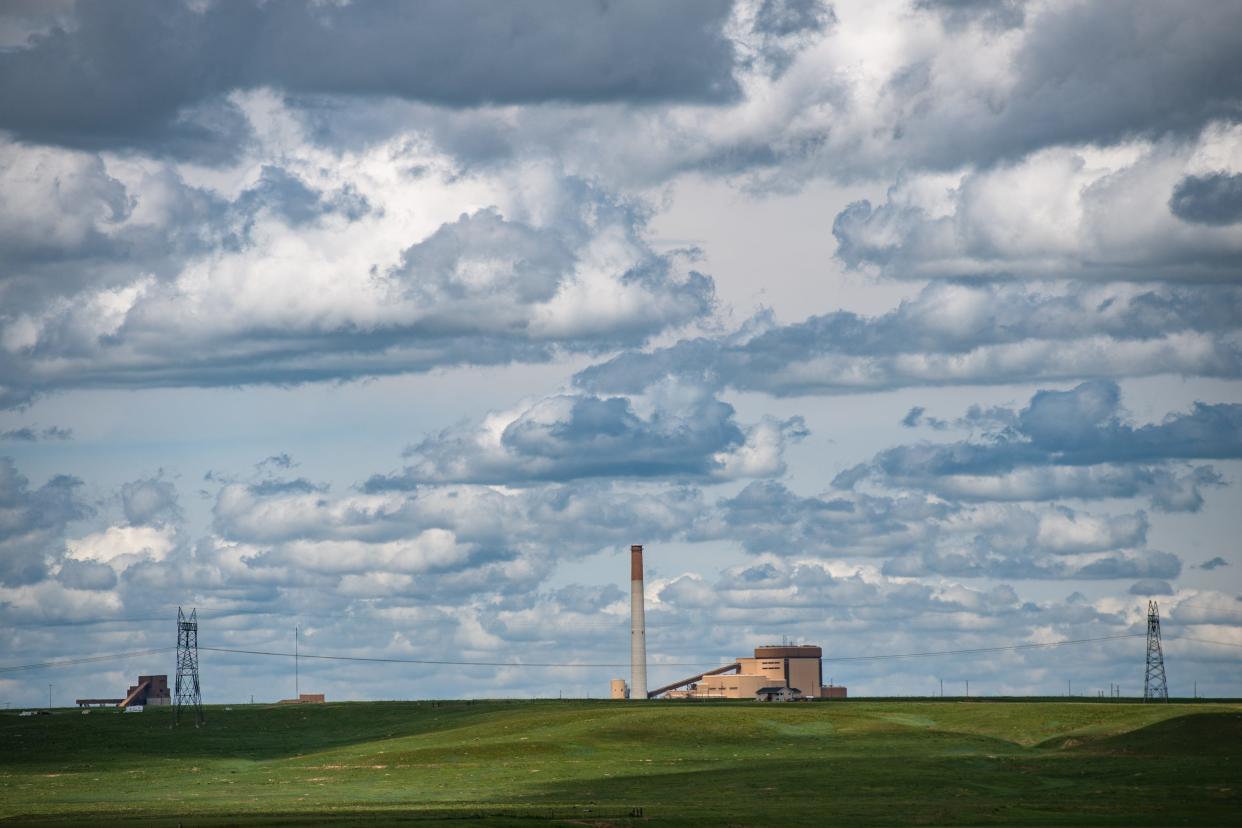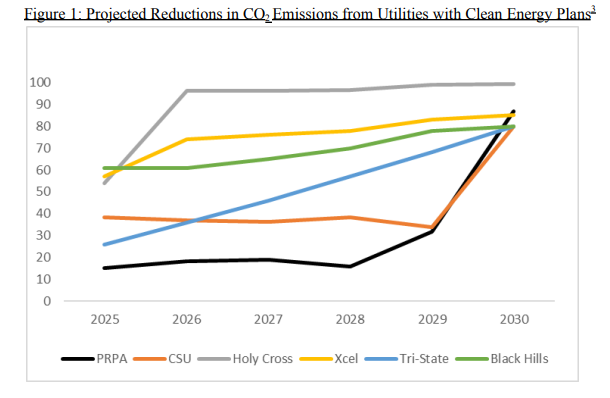Fort Collins' power provider faces added pressure to push hard on carbon reduction goals

Platte River Power Authority is facing pressure from Colorado and local lawmakers who are questioning whether the electric provider is putting off efforts to further reduce its carbon emissions.
The officials sent a letter to PRPA last month questioning whether the wholesale power supplier for Fort Collins, Loveland, Longmont and Estes Park will be in compliance with a 2023 state law that pushes electric providers to make incremental greenhouse gas improvements before 2030.
The concern seems to stem from PRPA's ongoing plans to pursue building new gas-fired turbines at a cost of about $240 million to provide electricity when wind and solar sources aren't producing due to what is known as "dark calm." PRPA is pursuing the gas turbines even though it has a goal of being 100% carbon-free by 2030.
In response to the letter, the power utility says it will comply with all that the state requires of it.
The 2023 law, Senate Bill 23-198, requires PRPA to model and examine two different energy portfolios that could achieve certain greenhouse gas reductions by 2027.
One model must show how PRPA could achieve at least a 46% reduction in greenhouse gas emissions by 2027 (over its 2005 baseline), and a second model must show how it could achieve greater reductions than PRPA's prior plan.
Under the new law, PRPA's board is required to consider each plan.
The letter to PRPA was signed by nine public officials, including Fort Collins Democratic state Reps. Cathy Kipp and Andrew Boesenecker, Larimer County commissioner Jody Shadduck-McNally and Fort Collins City Council member Kelly Ohlson.
Their letter says PRPA's public outreach regarding its 2024 integrated resource plan has so far not shown how PRPA intends to comply with the requirements. It asks the utility to remedy that by its next public meeting for the 2024 plan.
It goes on to warn that PRPA is falling behind other utilities in the state.
"Currently, out of the six Colorado utilities that have filed Clean Energy Plans, PRPA is dead last in reducing CO2 emissions, and is projected to remain in last place through 2029," the letter says. "In other words, every other utility that has filed a Clean Energy Plan expects to reduce CO2 emissions much more between now and 2029 than PRPA."

The lawmakers said SB 23-198 "is intended to harmonize the efforts of Colorado’s electric utilities so that they are all making the same minimum level of progress in decarbonizing their systems."
Further, the lawmakers urged PRPA to implement a plan that reduces more greenhouse gases by 2027: "Given that the legislature encouraged PRPA to achieve at least a 46% reduction in GHG emissions by 2027, we join the legislature in requesting that PRPA recommend, and its Board approve, a portfolio that achieves at least a 46% reduction in GHG emissions by 2027 while also reducing GHG emissions at least 80% by 2030."
In its response to the letter, PRPA said the required modeling is underway as part of its 2024 integrated resource plan and the utility will still meet — and plans to exceed — the state's requirement that it achieve 80% carbon reduction by 2030.
Javier Camacho, PRPA's director of public and external affairs, strategic communications and social marketing, said PRPA wasn't obligated to file a clean energy plan with the Public Utilities Commission, but it did so to show support for the state's clean energy goals.
And he noted that while PRPA is now required to model the portfolios, it isn't required to implement them.
"The law does not require a utility that has already filed a voluntary clean energy plan to implement the model results. Rather, the law only encourages the utility to achieve an interim target of 46% GHG emission reduction levels while ultimately meeting the state’s 2030 GHG emission reduction goal of 80%," Camacho wrote in the letter.
He said PRPA's 2018 resource diversification plan preceded and outpaces the state’s goal of achieving 80% carbon reduction by 2030. That plan sought to achieve 100% noncarbon energy by 2030.
He also said there are significant differences among the six utilities the lawmakers compared in their letter. PRPA is a community-owned, wholesale, public power generation and transmission utility, unlike private, investor-owned, co-operative, or fully integrated utilities, Camacho wrote in the letter.
"While other utilities with extensive thermal generation in their portfolios can continue retiring thermal assets by 2027, leading to a more gradual transition, Platte River has fewer, yet significant assets," including the Rawhide Unit 1 coal resource, "a unit that represents over half of Platte River’s generation portfolio," the letter said. Its retirement at the end of 2029 will "be the catalyst" to PRPA exceeding the state's 2030 goal.
The interim targets would add to the amount of investments needed by PRPA and would fall on the shoulders of its customers, Camacho said.
And "to say Platte River is breaking the law or in last place" is a gross misrepresentation of what the actual law states, he said. "Platte River Power Authority stands as strong advocates for a clean, affordable and reliable energy future for the state of Colorado, and efforts to transition its energy portfolio exemplify that. Platte River will not only meet the state’s goal but will exceed it — and that should be a point of pride for Colorado."
Groups like the Fort Collins Sustainability Group and Sierra Club say investment in a new gas facility now goes against PRPA's commitment to pursuing 100% carbon reduction by 2030.
PRPA's projections show it can achieve an 88% reduction by 2030. It's proposing construction of the new gas turbines, which it says can run on clean hydrogen once that technology is available. PRPA said it would expect the turbines to be used up to 20% of the time, when other noncarbon sources like solar and wind are not available.
Ohlson said he signed the letter after being asked to by groups and individuals with whom he shares certain values.
"I was hoping they'd rethink their position that appears they're going to invest $300 million in gas technology that I can't say I completely understand, when organizations and individuals throughout the state think it's misguided and that there's a better way to go about providing energy to Northern Colorado."
He said he felt PRPA's process "seemed a little fast" and should have included the involvement of the four cities that own the utility.
Each city has two representatives on the board. PRPA made presentations to all four of the cities in the fall, just about the time its board was considering a resolution to support the plan to pursue permits for the gas turbines.
Ohlson said he wants to see "if we can come up with other solutions or at least slow the train down and make sure we're examining all options."
Shadduck-McNally said she signed the letter after constituents brought it to her attention, and she cited her strong relationships with the state representatives who signed the letter and worked on the legislation.
Her concern is that PRPA would not be in compliance with the requirements for 2027, she said, and she wouldn't want "our community highlighted as not being compliant."
She said she has followed the utility's work and communicates with PRPA board members.
"I do believe PRPA is a wonderful organization and provides reliable energy for our municipalities," she said. "I think there's a lot to celebrate there, and I believe in them as an organization to achieve this."
She said since signing the letter, constituents have thanked her and asked for further action, but she said she is still evaluating that.
"We need everyone to collaborate together to meet goals for the state," Shadduck-McNally said. "And if we don't have everyone complying with the minimum, it doesn't help us."
Camacho said after receiving the letter, he reached out to all the signees and welcomes a conversation with them, but he hasn't heard from anyone.
This article originally appeared on Fort Collins Coloradoan: Colorado lawmakers send warning letter to Platte River Power Authority

